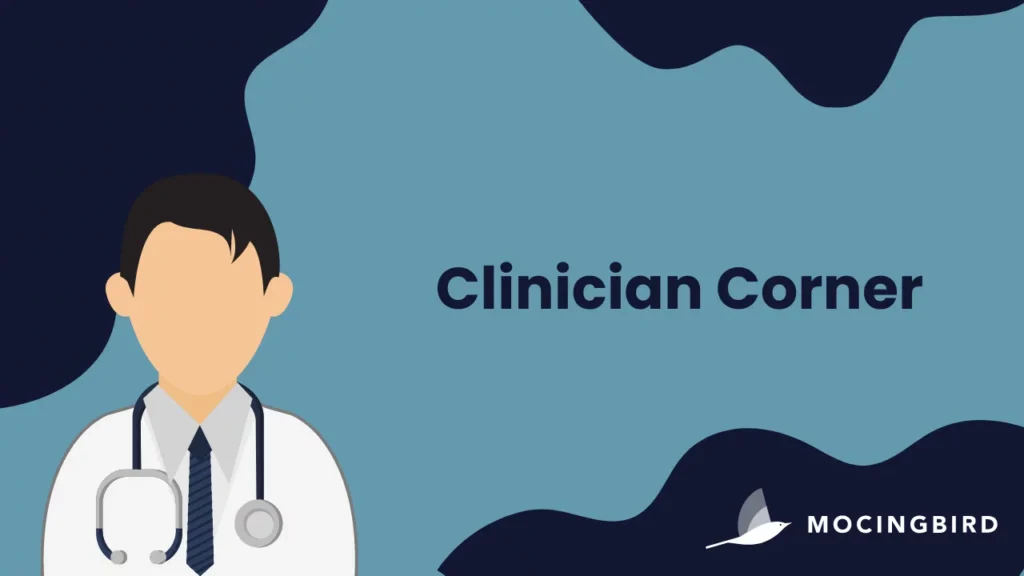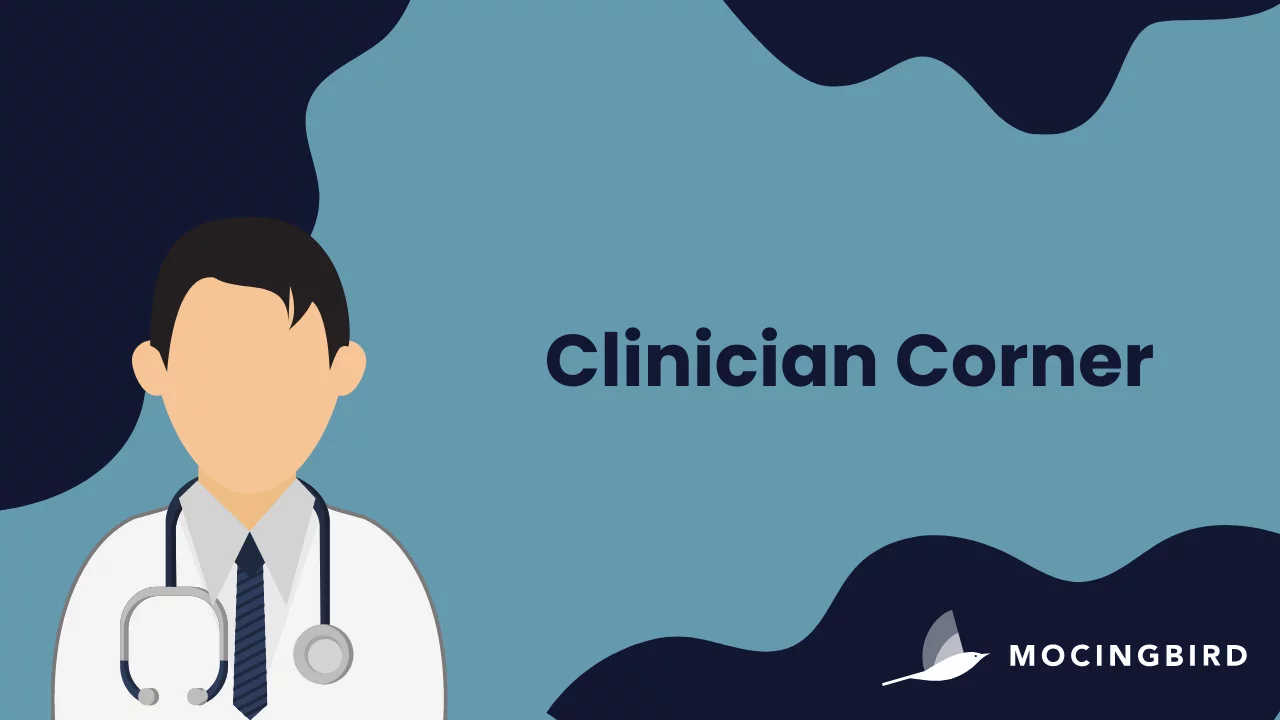The Mocingbird team had the pleasure to sit down for a chat with Dr. Dawn Forbes, neonatologist, founder, and CEO of NASCEND, one of our CME content providers at Mocingbird.
What came out of this conversation was a beautiful story of passion and determination to find a holistic solution for a clinical problem that is prevalent in the US.
Trauma-informed approach and bias in health care
“There are many different ways in which people could experience a pregnancy and a newborn affected by the risk of going through withdrawal because of opioid exposure, including something as simple as being a pregnant woman with a broken ankle who needs to be put on opioids for weeks.
“There’s a lot of stigma. Most of these families have a really bad disease (addiction) or a really bad circumstance that lead them to require opioid treatment, so whatever situation led them to be on opiates it is not necessarily their choice or them being ‘bad people’.”
Actually, many of the women who are struggling with addiction, as soon as they find out they are pregnant, often experience the impetus to get into recovery. The most successful addicts are those that have a non-self reason to seek recovery, and being a care provider for somebody else is a big driving force,” said Dr. Forbes
Dr. Dawn Forbes is a neonatologist that has spent the past 15 years taking care of sick newborns in the NICU. In 2010, at the beginning of her career, she recognized that she was seeing more and more babies exposed to opioids during pregnancy who would go through drug withdrawal after birth, experiencing Neonatal Abstinence Syndrome (NAS) and requiring up to 4 to 8 weeks of treatment in the hospital. Unable to find recommendations or guidance for a better solution for her patient population, NASCEND was founded to fill the gap – NASCEND is an innovative clinical solution, training, and technology company dedicated to improving outcomes for infants and families affected by maternal SUD.
A trauma-informed approach to care is a fundamental component of NASCEND’s educational purpose, as well as recognizing that these patients’ experiences with health care have often not been positive, and sometimes healthcare has not even been accessible or available.
From that perspective, NASCEND managed to go from a 2% breastfeeding rate in this population to more than 64% of mothers being able to safely and effectively provide breast milk. Most of the credit for this result goes to the trauma-informed approach and how they engage with the mothers, making sure they are more stable during pregnancy, more likely to be in recovery, and ready to safely provide breast milk to their babies.
In the words of Dr. Forbes: “We have to recognize that this is a population, especially at the maternal level, in which many of the individuals have suffered trauma, whether it’s physical, emotional or sexual. These are women that often have had very different life experiences than the average person who is pregnant or has a baby.
“Just the thought of breastfeeding is very tough when you have used your body as a source of income and a means of maintaining your livelihood or getting the things that you need. It is difficult when you are suddenly asked to perceive your body differently and to use it as a nutrition source.“
“Another example is holding a woman down while she is giving birth, which might not impact someone who has never been tied up or beaten, or abused. If you have had this experience, just the contact of someone holding your legs or your ankles or your wrists can really be traumatic. Add to that people’s biases, comments, words, and body language. That can make for an extremely negative experience and we wanted to change all that.“
By relying on the feedback provided by the families through surveys, NASCEND was able to learn that these parents now feel seen and heard and have a better understanding of health care and of what is happening to their newborns, as they feel engaged and part of the care team.
The rates of need for Child Protective Services (CPS) involvement also went down after the program implementation, as an increased stability for the parents translated into an increased ability for them to take care of their babies, preventing these kids from having to go into the foster care system.
When asked about the impact of NASCEND, Dr. Forbes told us: “We wanted to make sure that we addressed the stigma that is associated with this diagnosis; to not forget that all of us, even in healthcare, have bias and that it comes out in the things that we do, in the decisions that we make and in how we interact with people. From a healthcare provider perspective, the training that we have been doing nationally in collaborative groups has had an impact on almost 1.5 million babies, who had the opportunity to get better care and better outcomes. That’s our ultimate goal, that’s what we are trying to do.
“At the end of the day what we want is healthier moms, healthier babies, healthier families, and healthy homes.”
NASCEND’s mission and results
NASCEND has achieved astonishing results. In the past 12 years, they reduced the number of newborns experiencing NAS and requiring pharmacological treatment from approximately 60% to about 30% and to even less than 10% in experienced NASCEND-trained institutions. The average length of hospitalization was also reduced significantly, decreasing from 6-8 weeks to today’s average of 13-18 days.
NASCEND’s mission goes beyond improving NAS bedside care and non-pharmacologic treatments; it seeks to improve the experience of pregnancy and birth for moms struggling with opioid use. Whether their struggle stems from prescription or illicit use, NASCEND’s commitment is to educate these patients and healthcare professionals about addiction and offer them a better way to treat NAS.
Dr. Forbes’ journey in starting NASCEND is not only inspiring but also highlights why many healthcare providers went into medicine – to create an impact in people’s lives and to improve their health. With the new courses from NASCEND, providers are equipped with tools that can connect them closer to their patients and prescribe the best solutions according to the patients’ needs. At Mocingbird, we strive for the same goal – providing a streamlined CME management tool and matching it with high-quality education to clinicians, so licensure requirements are no longer just checking boxes.
About Dr. K. Dawn Forbes MD, MS, FAAP Founder and CEO of NASCEND
Dr. Forbes is a nationally recognized expert in the care and improved outcomes of infants and families affected by maternal substance use disorder, opioid use in pregnancy, and infant withdrawal. Dr. Forbes founded NASCEND as a way to share her experience with other health care providers across the country. She provides NASCEND’s vision, direction, and product strategy and advances all training and education initiatives. As a practicing neonatologist, Dr. Forbes provides direct care for substance-exposed infants in the hospital and provides opioid-assisted treatment (OAT), counseling, and education for pregnant and parenting women. She is also the principal investigator for several ongoing research projects.
What is NASCEND
NASCEND is an innovative clinical solution, training, and technology company dedicated to improving outcomes for infants and families affected by maternal SUD. Unlike the Finnegan Neonatal Abstinence Score, which is a complex 23 symptom checklist on a paper system used only as an assessment tool to understand a newborn’s level of withdrawal, NASCEND looks at 6 key symptoms and provides both an assessment and treatment recommendations. NASCEND’s approach is incorporated into a user-friendly app, which is comfort-focused, responsive, and objective. The app allows any healthcare professional who takes care of newborns at risk of withdrawal, such as nurses, pediatricians, and neonatologists to provide standardized care in any hospital from newborn nurseries to high-level NICUs.
The continuity of care NASCEND grants is the same from provider to provider because the assessment is not based on subjective opinions regarding the 6 symptoms like a checklist would, but rather on an algorithm that analyzes several objective questions about the 6 parameters, allowing the answers to be uniform among all healthcare professionals.
NASCEND streamlined many of the processes and incorporated handouts as well as educational tools and guidelines for both the staff and the family. While the treatment options for NAS twelve years ago focused on pharmacology, today they revolve around non-pharmacological comfort measures and NASCEND made it a priority to integrate music and other comfort techniques in the management of these patients.
NASCEND also considers the family to be a fundamental part of the care team and it has worked hard to address some deeply rooted problems in healthcare like stigma and bias, focusing on providing a trauma-informed approach to care at multiple levels: the healthcare provider, the family, and the community.
Today NASCEND has evolved into much more than guidelines and protocols. It incorporates technology, including apps and a music player that will soon become an interactive music app for both the family and the healthcare professional. They not only provide education and training, but also a third-party certification for the quality and care of this population for both the individual providers and the institutions that provide care.




